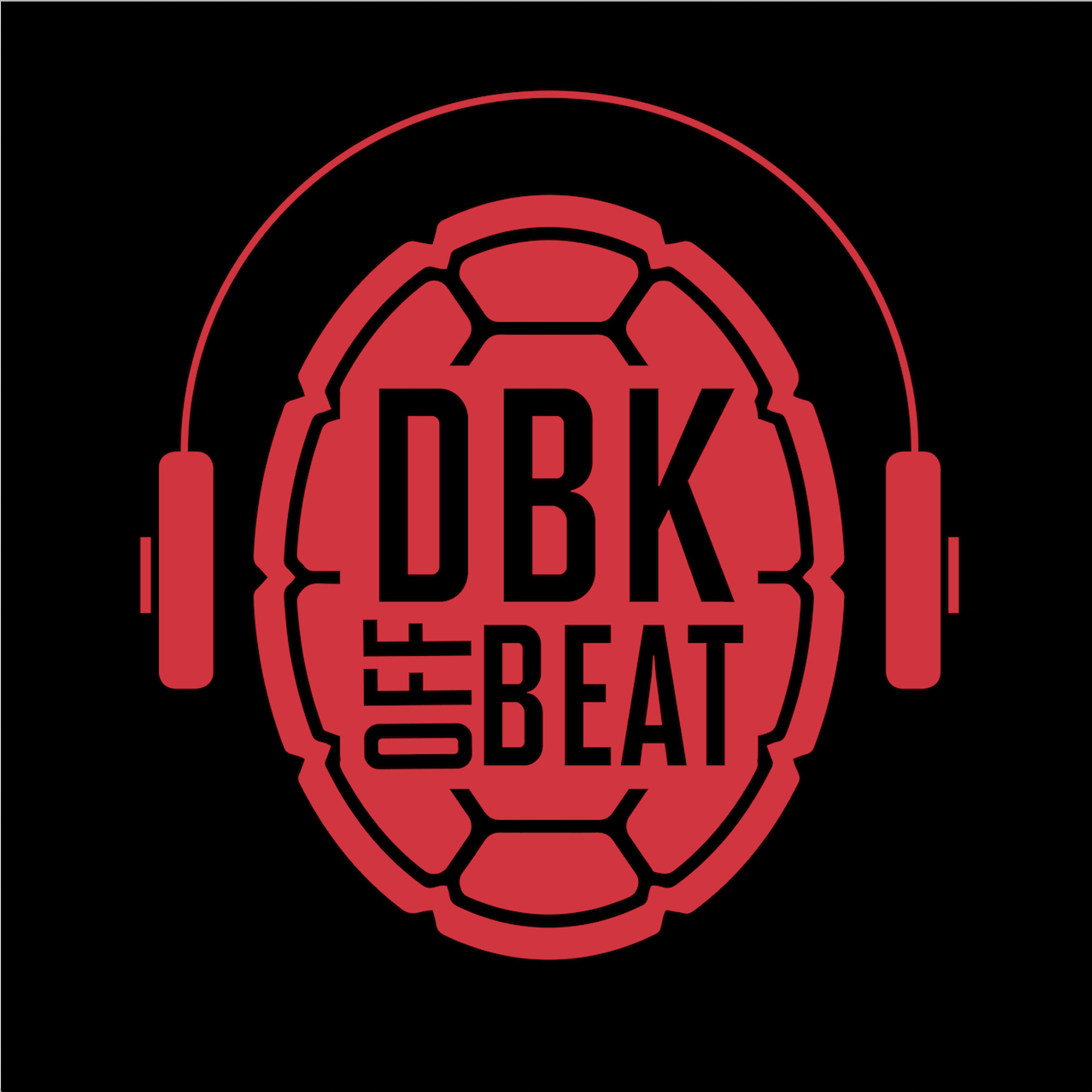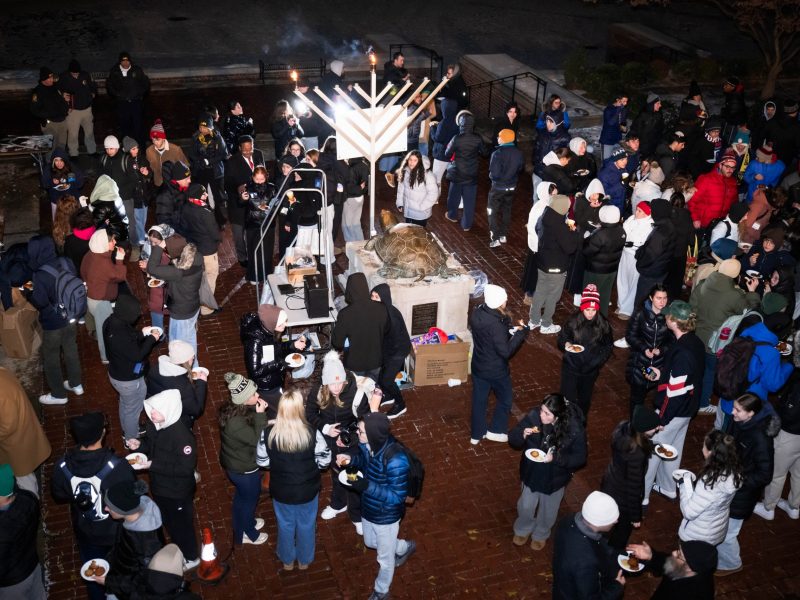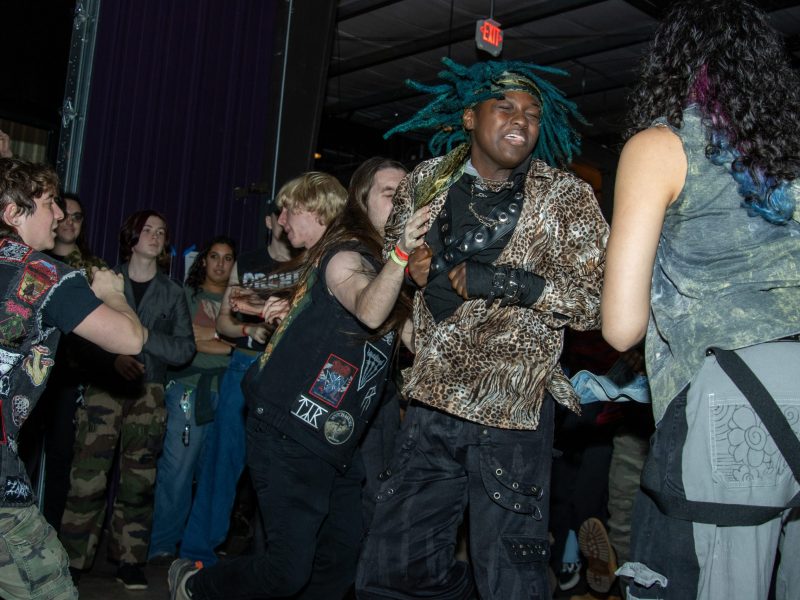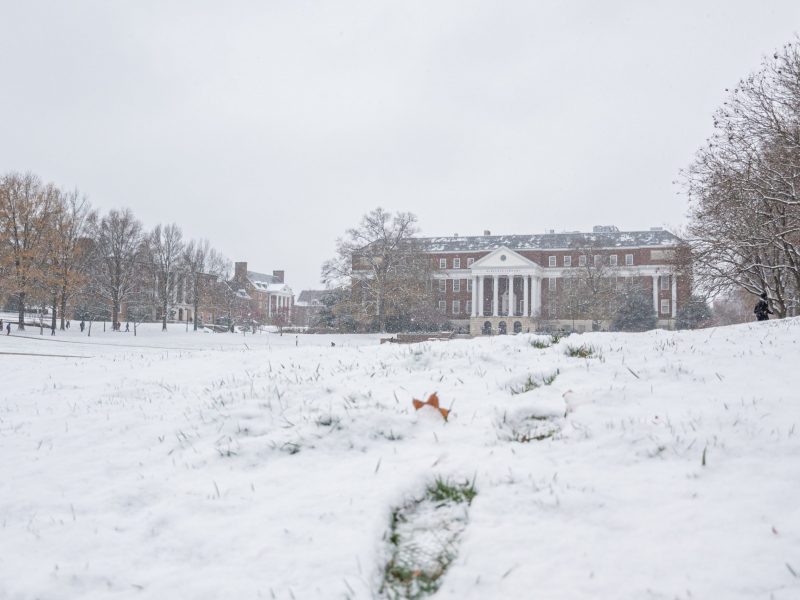We are now a more than week out from midterm elections, results are still rolling in, and voters across the nation are anxiously awaiting to see who the winners are. This episode Offbeat took to the polls to see how UMD’s voters actually felt about the midterms, and spoke to experts on what young people’s voting habits look like. We’ll also look at how this election is different from previous ones, from the nation’s climate to turnout in general.
You can find us on Spotify and Apple Podcasts. A full transcript for this episode is below.
STELLA ROUSE: And so if young people are gonna marry their passion for these issues and have that translate into a change in policy, they’re gonna have to come out and vote, and I think there’s, at least, a signal that that’s occurring.
[MUSIC]
MEGAN BARNES: Voting. It’s a basic right that all Americans 18 and older share, but mobilizing people to do so has always been a point of concern in most elections. However, in recent years, young people took the polls at higher rates than ever before. Mail-in ballots are the new frontier, and many universities have their own polling locations on campus to grant easy access. And with midterms happening just last week, it should seem like an easy thing, but factors like identity and lack of information act as barriers to the political process.
Welcome to Offbeat by the Diamondback, a podcast about passion and power at the University of Maryland. I’m your host Megan Barnes. For this episode, I wanted to see just how mobilized UMD students were to vote in the recent midterm elections. I also spoke with experts to gain insight on the brains of young voters and what universities can do to ensure student voices matter. Don’t be afraid to stick around until the end to break down the current results of these tight races.
[MUSIC TRANSITION]
MEGAN: The only way to ask UMD students why they voted was to take to the polls myself. There were two polling places on campus: One at STAMP and the other at Ritchie Coliseum. We asked various students why they voted and why they felt midterms were important. I’ll let them take the lead.
JULIA WALL: As a woman, you know, we haven’t always had this right to vote, and I felt like I was doing a disservice to our ancestors by not voting in a way. And also I feel like you can’t really complain about things that are happening if you don’t, you know, use your right to vote.
EUGENE BANG: I think as citizens, especially in Maryland, it’s important for our voices to be recognized in voting for local lawmakers and also for the gubernatorial election in general.
AMANDA NOBIL: I think everybody’s voice matters, and, I mean, the fate of the nation is in the people’s decision, so I want my voice to be heard.
RAYMOND JAMES MCGHEE: I mean, I think I’ve just been told throughout my life, that it’s important to participate in the democratic process, and I think it’s important for young people to show out to vote show that we need to be represented show that were worth catering to in terms of like, candidates platform. So I think that by coming out to vote, we’re showing that we need to be heard and the issues that we care about, they should care about too.
JULIA BUSHMAN: I think it’s so important. I’ve like been texting my friends and like encouraging them because like, I feel like a lot of people, especially like students, like a lot of us are are out of state. So it’s like, knowing where you can vote and just like encouraging people and like, every vote counts. And like, even though it seems like it doesn’t, it’s like I feel like it’s a part of like, being an American citizen is like voting because like, if you have an opinion, you need to like voice that no matter what that is, like, you need to be like represented, so
MEGAN: While some seemed well-versed in all things politics, others viewed things at a more … surface level. I asked some students which was more important: midterm elections or the presidential election.
ARCHIT RAVISHANKAR: Obviously the presidential election and stuff get more popularity and media attention, but I feel like the midterm elections is also very important. Especially just because all the small issues and stuff or the local lawmakers, and the local county executives and state senators that do actually make those possible. So I think they’re both important, but I feel like midterm elections are a bit more important for each individual person.
JULIA WALL: I’d say midterms definitely aren’t as, I guess, advertised as the general elections are, and a lot of times it just goes under the rug especially for college students’ minds like with midterms coming around the corner, or just passing. It’s kind of like the last thing on a lot of people’s minds. And it’s something that you kind of have to dig for to get information on to find out details on how to do this.
ANGELA LUO: I’ll be honest with you, I do not know the difference between the two, so I feel like that says enough about like how prominent it is, but I think as you get older you start involving yourself in politics more and more, so I think it’s just like a natural thing.
MEGAN: Another student was mostly just along for the ride.
GEORGE JAMALDINIAN: She was going, so I followed her here. She encouraged me. I would not have gone — or at least I wouldn’t have prioritized it. I could follow it more, but I just don’t.
MEGAN (on tape): Like do you feel it’s not as important as…?
GEORGE JAMALDINIAN: No I still think it’s important, I just don’t prioritze it.
MEGAN: A much as like a general, presidential election?
GEORGE JAMALDINIAN: Yeah, like, I have friends that actually care about it, so I just follow their lead.
MEGAN: But how can we explain this lack of knowledge or even the younger generation’s newfound passion for the polls? I spoke with Dr. Stella Rouse, a government and politics professor at UMD who specializes in how identity informs political attitudes and representation.
STELLA ROUSE: I think historically, younger people have not been as engaged, particularly in voting. I think young people are engaged in other forms of civic engagement and participation, things like protests and marches are things that young people tend to gravitate toward, issue based things like that. But, in terms of voting, we’ve always seen a gap between older adults and younger adults in terms of turning out to vote, and that’s amplified in midterm elections because, obviously, most of the population is really focused on the presidential elections when they vote.
Now I will say that over the last two midterm elections, that we have seen an increase in young people coming out to vote. We don’t have the numbers yet, but it looks like we’re going to see record turn out for young people. Young people have really made a difference in this election, is what the exit polls are showing, the preliminary data.
But I still think we have an information gap, even among college students, right? You talked to a student who didn’t even know the difference between the two. And so, you know, I think often times we forget that even more educated people perhaps may not be educated when it comes to politics and voting, and when elections are being held and what they’re being held for and why they matter.
MEGAN: But what can be done to mobilize young voters and keep them informed? This isn’t a new idea, and, over the course of the past few years, numerous nonprofits and organizations have been founded to combat the lack of young people at the polls.
JENNIFER DOMAGAL-GOLDMAN: My name is Jen Domagal-Goldman, and I am the executive director of the ALL IN Campus Democracy Challenge which is a non-partisan national initiative of Civic Nation that works to support more than 950 colleges and universities across the country as they work to improve civic learning, political engagement and non-partisan voter participation.
MEGAN: UMD was actually the very first school to join this initiative back in 2016. President Darryll Pines even joined the group’s presidential commitment to strive towards full student voter participation. Domagal-Goldman told me that mobilizing students to vote tackles three key themes:
JENNIFER DOMAGAL-GOLDMAN: So we talk about civic learning, political engagement, and then voter participation. So, in that, we’re really focusing on the both, the legal requirement and kind of the ethical and moral obligation that colleges and universities have to help their college students register students, eligible students, to vote, to educate them about how the process works, and what their rights are and how to understand their ballots and the process and then to be able to access polling places. And also to show up and turn out at the ballot box, whether that be voting by mail, or voting early, or voting on campus, or voting at home. So really helping them help that and you know, at a campus like the University of Maryland, you have a huge proportion of students who come from within the state of Maryland.
But also, in that class, and on your campus, and on other campuses like you, you have a large number of students who aren’t from the local area, aren’t from that state, and need to follow different state and local rules about elections, and usually focus on a given campus aren’t experts about that, and so part of what we bring to the table is the ability to share information and to share ways of engaging students who either, you know, may choose to vote somewhere else and have different timelines and processes they need to follow, and to really help students show up.
MEGAN: Domagal-Goldman views voting as a sort of muscle that you have exercise in order to continue the habit. So the earlier people vote, the more likely they are to to keep doing so for any future elections.
Dr. Rouse offers some insight as to why some college students fail to use this so-called democratic muscle in the first place.
STELLA ROUSE: At the college level, I think one disconnect is often between students who are in the social sciences and sort of self select themselves to be interested in politics and in voting versus students who, perhaps, that are in the hard sciences and STEM-based fields that are likely to be less engaged in the political system simply because they’re interests are not really tied to politics or policy or things like that. So having a concerted effort in terms of reaching out to those students and informing them and educating about how important it is to be civically engaged regardless of what field you’re in I think is really important and something that should be more of a priority for any institution, but, if we’re talking about Maryland, I would say even for the University of Maryland to prioritize those efforts to get civic education in the training that STEM and hard science students receive because many of them have had no reason to really be interested and don’t feel like what they do really translates into politics. So that shouldn’t be discounted as being a citizen regardless of what you do, whether you’re an engineer or you’re a scientist or whatever the case may be, it’s still really important to participate in the process.
MEGAN: But this isn’t to say that UMD hasn’t made any efforts to mobilize student voters. In fact, recent data shows otherwise.
JENNIFER DOMAGAL-GOLDMAN: So we launched in 2020 a president’s commitment to full student voter participation and your president signed that commitment. We know that campuses who signed that commitment in 2020 had an average of 5.7 percentage points higher student voter turnout than other campuses.
In the last midterm election in 2018, the University Maryland had an 85.3 percents registration rate, which is fantastic. You had a 36 percent turnout rate, which was up from 26.7 percent in 2014. And then in 2020, you had a student voter registration rate of what I would argue is basically the same, it was 84.7, and a student turn out rate of over 71 percent.
MEGAN: As I scrolled through Twitter on Election Day, I saw numerous videos of college students lined-up at the polls, with some of the lines even going around the corner. Some of these students were waiting in line for over 90 minutes, a fact that I was first excited about. Students across the nation wanted to vote and the fact that they were waiting in line for that long showed that they really care. But this is a double-edged sword.
JENNIFER DOMAGAL-GOLDMAN: They shouldn’t have to wait in lines for two hours you know what I mean? And so how do we make sure that that doesn’t happen? Does it mean one of those campuses needs two or three polling sites on campus instead of one? Does it mean that we need to do a better job of helping them understand there are other ways that they can vote? Are we seeing higher numbers in states who have implemented same day voter registration, which we know helps decrease a barrier to young people and first time voters voting, because if they can register on that same day, that’s great, but that can make the line take longer, right?
Transportation could be a barrier, having classes or work and not being able to get time off can be a barrier, right? Not having the right ID in specific states could be a barrier or the evidence of their address, you know, particularly around campuses.
MEGAN: Every school that joins ALL IN creates an action plan for the election cycle regarding those three key elements we mentioned earlier. They’re all dependent on the needs of each campus, and ALL IN has a primary contact, usually a faculty member, who acts as a liaison between the group and campus.
But civic education should not only be restricted to college students. In fact, both Domagal-Goldman and Dr. Rouse agreed on the fact that it needs to extend to the youngest potential voters.
STELLA ROUSE: Direct efforts at civic education are really important. Like one thing that myself as a political science professor and someone who believes in civil engagement its been disheartening to see those types of classes at the high school level have been pretty much abandoned, so students at a younger age aren’t getting that civic education, so returning that would be I think a priority or be part of efforts to return that.
JENNIFER DOMAGAL-GOLDMAN:We need to grow voters, like it’s not just something that happens one day. And so it takes more than just the work of a single higher education institution to help do that, right? Like there are policies that need to be thought about and put in place. There’s work that needs to be happening at the K-12 level. You know, there’s work that peers can do to help engage their fellow students and other things. There are roles for faculty to play in terms of sharing reminders or pertinent information in a classroom. You know all of these different pieces come in to kind of create this broader framework, and until we kind of do all of those pieces, you know we’re never going to see the kind of full voter engagement that we really want to see.
MEGAN: To say that the younger generation isn’t engaged in politics would be a lie. They just have a different way of showing it.
RAYMOND JAMES MCGHEE: That that can come from either being really like cynical, and like feeling like your voice doesn’t matter. And just like being, like, kind of like jaded toward the democratic process, which I think I think I’d like push back against that because that I think just compounds the problem.
STELLA ROUSE: What my research has shown, generally, young people tend to engage differently than older people, not necessarily less. And sometimes the way that the media portrays young people is looking at whether they vote at similar rates as older people, and then, when they find that they don’t, they say ‘Well, they’re not interested in politics,’ and that’s not true. They’re interested in a different form of participation, sort of an active form of participation rather than a duty based form of participation. And so, what I’ve found in my work is that young people really are engaged, like I said, in protests, marches, boycotts, things that have a more direct effect because they have traditionally been very, sort of, disheartened by institutions in what they can do and have believed that their vote maybe does not matter in terms of bringing about change.
But what I would say is, in the last two midterm elections and in the last presidential election, young people have come out in higher numbers and it’ll be interesting to see whether that trend continues this year, which I think it will, and into 2024. And so maybe by that time we can actually say that young people are catching up in terms of their voting rates compared to older people which would be a great sign because ultimately all that passion and effort that goes into, for example, marching for climate change or the MeToo Movement, that ultimately you need the right people in office to bring about policy change. Marches and things like that bring about a lot of attention but not necessarily change a policy. And so if young people are gonna marry their passion for these issues and have that translate into a change in policy, they’re gonna have to come out and vote, and I think there’s, at least, a signal that that’s occurring. A very promising signal, and we’ll see if that holds up.
[MUSIC TRANSITION]
MEGAN: So where exactly do these election results stand?
The biggest surprise was a Senate race in Pennsylvania. John Fetterman defeated Dr. Mehmet Oz to flip a seat for Democrats, giving the party its first glimmer of hope. On top of this, democrats officially maintained majority over the Senate after tight races in Arizona and Nevada were finally called over the weekend. This just leaves Georgia, where democratic incumbent Raphael Warnock and Republican candidate Herschel Walker are facing a potential run-off election. Will Democrats have a fifty-one to forty-nine majority, or will both parties see an equal split?
Let’s shift to the House, where Republicans are expected to take control. In Virginia, Republican Jen Kiggans ousted sitting January 6 committee member Elaine Luria. On top of this, three-term Democratic congressman Tom O’Halleran saw defeat by Republican businessman Eli Crane in Arizona.
It wasn’t a clean sweep, however, as Democratic candidates were able to flip seats in states like North Carolina, Texas and Ohio. Shout-out to Florida, who elected the first Gen-Z candidate to Congress. Maxwell Frost will take his seat at just 25 years-old with the hope of bringing young voices to the House floor.
Finally the governors. Maryland had a huge win, with Democrat Wes Moore defeating Trump-endorsed candidate Dan Cox. He is the first democratic governor since 2015 and only the third Black governor to be elected in the United States — ever. In Texas, Beto O’Rourke lost to incumbent Republican Greg Abbott, this being his third election loss overall.
In Arizona, republican Kari Lake was defeated by democrat Katie Hobbs in a very close election for the state. Massachusetts and Oregon made history by electing the nation’s first openly lesbian governors: Maura Healey and Tina Kotek.
The election isn’t over yet, as mail-in ballots continue to be counted and residents of Georgia might face another go at electing their senator. All we can do is wait and keep a close eye on the polls, I know I will.
[MUSIC TRANSITION]
Thanks for listening to Offbeat! I’m your host Megan Barnes. This episode is brought to you with the help of our editor Julia Bishoff, our assistant editor Grace Kpetemey and our reporter Fatima Yazdi. Our music this month is by Alexander Nakarada. Follow Offbeat on Twitter at @DBKOffbeat and follow the Diamondback on Twitter and Instagram @theDBK. You can find a transcript of this episode at DBKnews.com. And if you liked this episode, tell your friends and tune in next time!
[MUSICAL OUTRO]
Music:
The following music was used for this media project:
Music: Favorite by Alexander Nakarada
Free download: https://filmmusic.io/song/4855-favorite
License (CC BY 4.0): https://filmmusic.io/standard-license
Artist website: https://www.serpentsoundstudios.com/



